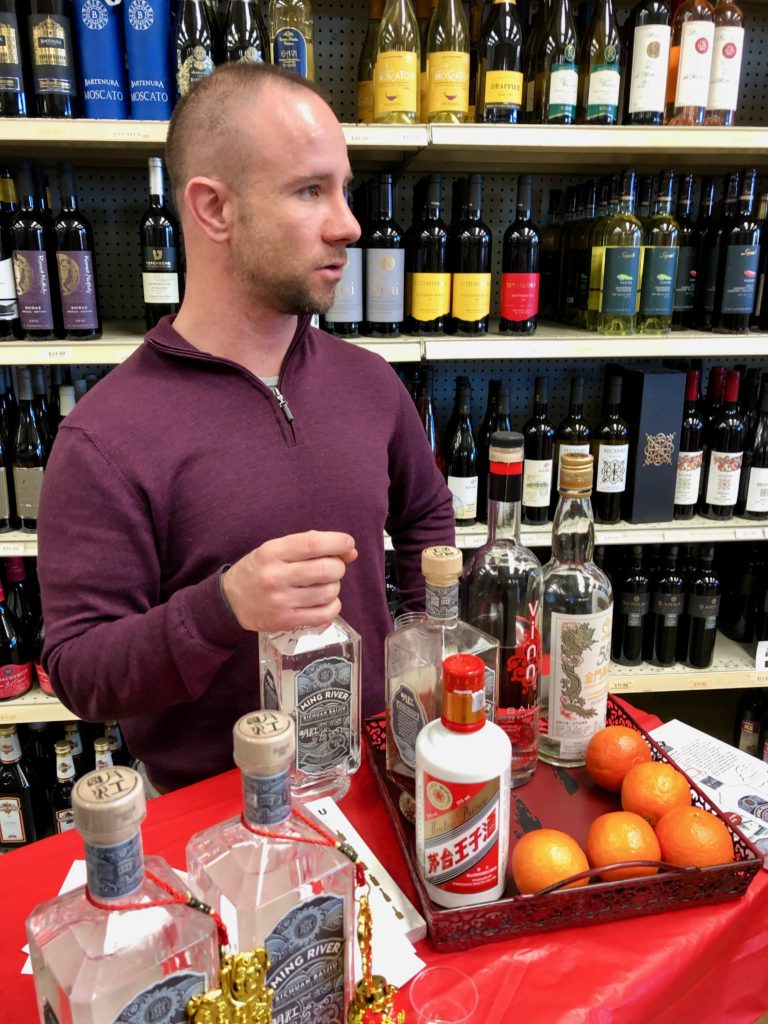
Have you ever tasted baijiu (prounced bye-jyo)? Nevermind. Have you ever heard of it? Probably not. Neither had I, until recently.
It’s a Chinese spirit –the world’s best-selling alcohol by volume, outselling whiskey and vodka combined – that some non-Chinese may find challenging. A white spirit with a savory funkiness, it stands apart from other spirits, and to say that it’s an acquired taste is an understatement. Some might liken it to firewater. Indeed, some brands exceed 100 proof, but not all. Others refer to it as the stinky tofu of the liquor world. This is closer to the truth.
Nevertheless, I celebrated the Chinese New Year at my favorite restaurant, The Orient, in Bethpage, NY, with this traditional Chinese tipple, after sampling several baijiu recently at Post Wines in Syosset, NY, guided by Bill Isler, director for North America of Ming River, a new brand that arrived stateside just months ago.
Baijiu, which translates to “white alcohol” in Mandarin Chinese, Isler told me, is usually made from sorghum, a common animal feed, but can also be made from other grains. Its ingredients and style vary by distillery and region, but generally are divided into four flavor classifications: strong aroma (full bodied, spicy, fruity), light aroma (light, floral, slightly sweet), sauce aroma (umami, mushroom, earth) and rice aroma (light, clean, honeyed).
Isler and his partners hope to create new spirits category in the U.S. To be sure, other baijiu are sold in the U.S., mostly in Chinatowns. One, Vinn, is made in Oregon using brown rice from California.
Isler’s product, Ming River, is a strong aroma baijiu, though the label identifies it as Sichuan style. It’s made by a distillery that’s been producing baijiu since 1573. Made from red sorghum and fermented the traditional way – in clay pots with locally harvested yeasts that are buried for two weeks in pit – the result is a 90-proof spirit.
My tasting with Isler began with Oregon’s VInn Baijiu, whose nose reminded me of sake. It’s of the rice-aroma classification, so no surprise. Its floral and at 40% ABV it goes down easily with a bit of a nutty finish
My second taste was a baijiu classified as a light aroma, Kinmen Kaoliang, from Taiwan. At 116 proof it’s got a kick that made me wince upon my first sip. It’s a bit like a grappa and somewhat reminiscent of Rhum Agricole from Martinique. It has a grassy, herbal character.
Next up was Isler’s brand, Ming River, classified as a strong aroma baijiu. It offers up bright, fresh tropical fruit notes along with some licorice-like star anise and a sweet funkiness. My guess, it’s been designed to appeal to western palates.
The final baijiu in the flight was Kweichow Moutai Prince, from China’s largest distillery, categorized as a sauce-aroma baijiu. It’s 106 proof and has big-time funky notes of stinky cheese and mushrooms. It finishes surprisingly sweet.
Isler’s Ming River brand is an outgrowth of a successful bar, called Capital Spirits, that he and ex-pat partners started in Beijing that was dedicated to single shots of baiojiu,. Isler, for one, who majored in Asian studies at Columbia University before spending decades in China, calls himself a serial entrepreneur.
Ming River Baijiu, made at the state-owned Luzhou Laojiao, China’s oldest continually operated baijiu distillery, starts with a mash of locally harvested red sorghum grain and local well water. It is fermented in 30-year-old earthen vessels with naturally harvested yeast cultures native to the Sichuan river town of Luzhou. After two months, the mash is unearthed and distilled in small batches using a traditional Chinese pot still. The spirits then are aged for up to two yearsbefore blending into Ming River’s distinctive flavor.
Baijiu is traditionally enjoyed neat at room temperature, but Isler is working with bar tenders in trendy eateries to develop cocktails based on the spirit. He likens Ming River to Rhum Agricole, the white rums made from sugar cane in the Caribbean that are often components of cocktails.
A 750ml bottle of Ming River retails for $34-$35 with distribution currently limited to New York, Los Angeles and San Francisco. In New York, you can find it at Bottle Rocket in Manhattan, in Brooklyn at the Brooklyn Wine Exchange andat Post Wines. Park Street Imports LLC, of Miami, FL, is the importer.
I purchased a bottle of Ming River and brought it to dinner. Most of my companions were not enthusiastic. I enjoyed it, however, sipping numerous cups as we dined on some 11 courses of Cantonese fare. Gan-bei!
